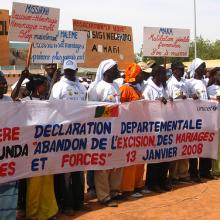genital mutilation
BOSTON -- The one thing that Afrah Farah will tell you about her genital cutting experience is that it happened. She doesn’t want to say how old she was, where it happened, or who was or wasn't with her.
Yet, despite the painful memories that the experience evokes and her concerns about people's reactions, Farah, said she knows she has to speak out.
“It’s basically a traumatizing experience. It’s traumatizing for every young girl that goes through that. It’s something that sticks in your memory, and physically,” said Farah, a Somali immigrant who came to the Boston area by way of Kuwait and Germany in 2007, and now works as a drug developer in a Massachusetts laboratory.
“There are millions of people who are affiliated with this procedure -- parents, grandparents, people in the community -- and to label them all as bad people or barbaric, that’s wrong. You will push them away. To solve a problem like this, you need to approach people with respect.”
Because of its severity and prevalence, female genital mutilation (FGM, or "cutting") is arguably one of the most important human rights issues in the world. It’s also become increasingly important in the U.S. as the number of immigrants from countries where it is practiced grows.
